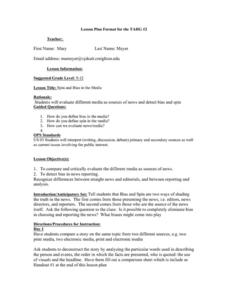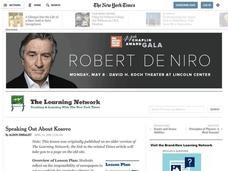Facing History and Ourselves
Free Press Makes Democracy Work
A unit study of the importance of a free press in a democracy begins with class members listening to a podcast featuring two journalists, one from a United States public radio station and one from Capetown, South Africa. The lesson plan,...
Facebook
What Is Verification?
One of the most important skills news consumers and social media users must develop is the ability to determine the veracity of stories they read or view. Here's an interactive lesson plan that teaches high schoolers how to verify news...
Curated OER
Dinosaur Designs
Second graders examine facts that can be found in nonfiction books. They listen to a read aloud of Patrick's Dinosaur, with time before the end for student predictions. They make dinosaur t-shirts using facts from the book.
Curated OER
Is That a Fact?
Third graders listen to a paragrah as it is read and write down points that they think are important. They answer several comprehension questions to check for understanding of the passage. They then read pages in their science text book...
Curated OER
Electrifying Franklin
Fourth graders research and present information about Benjamin Franklin's life and accomplishments. For this lesson on Benjamin Franklin, 4th graders review idioms and sayings written by Franklin then compare and contrast his various...
Curated OER
Spin and Bias in the Media
High schoolers compare different types of media. In this media comparison lesson, students will assess the where all types of media gets its information by viewing a video of a news story and critiquing it.
Curated OER
Inglourious Basterds
In this Inglourious Basterds worksheet, students read the book Inglourioius Basterds, and complete fact and opinion, character details, and short answer questions about it. Students complete 26 questions.
Curated OER
Recognizing Bias
This PowerPoint outlines methods for recognizing bias in various forms of media. The presentation defines loaded words, stereotypes, and one-sided arguments as types of bias and also highlights the characteristics of facts and opinions.
Curated OER
Family Life
What is family? Challenge your scholars to write an encompassing definition of what this word means to them. After reading "It May Be a Family Matter, But Just Try to Define Family," class members discuss the emotional issues surrounding...
Scholastic
Reading Skills Profile
Assess your young learners' reading skills, from sounding out words to general comprehension and identifying facts vs. opinions, with this excellent worksheet. The resource also includes a goal-setting worksheet that focuses...
Curriculum Corner
Editable Exit Tickets
Here is a resource with 28 different exit ticket formats that can be used across the curriculum. Opportunities for exit assessments are endless with various prompts such as, "2 facts I learned today are..." or "I need extra help with..."...
Virginia Department of Education
The Writing Process for Persuasive Writing
Get your junior high writers stimulated with the strategies and ideas available in this activity. Learners discuss and debate controversial subjects, and outline their reasons with an online graphic organizer (link included) that creates...
Curated OER
Children's Media and Censorship
High schoolers form opinions about children and television censorship after analyzing literature. They complete a journal writing activity to identify the topic and make a list of inappropriate television shows for children. Next, they...
Scholastic
Persausive Writing
A unit on persuasive writing guides elementary learners through the writing process. The first part examines the elements of persuasive writing, including expressing an opinion, connecting ideas, using supporting facts, and writing...
Curated OER
Thesis Statements
At 32 slides, one would think this presentation on thesis statements is a bit too long, but it is the most important component of a well-written essay! Help your developing writers craft concise, interesting theses with this PowerPoint....
San Francisco Symphony
Mr. Lincoln Through the Eyes of Aaron Copland
Use Aaron Copland's symphonic piece, "Lincoln Portrait" to engage learners in a cross-curricular experience. They'll listen to the piece, watch a video, read the Gettysburg Address, and write a series of fact or opinion sentences. An...
Equality and Human Rights Commission
Influencing Attitudes
Does propaganda—like that used during the first World War—exist today? The 11th lesson in a series of 12 highlights the role of media when it comes to influencing attitudes. Scholars learn about sensational headlines, misrepresentation...
State Bar of Texas
Tinker v. Des Moines
Freedom of speech allows anyone, even those in school, to say and do what they feel—right? The 1969 Supreme Court case Tinker v. Des Moines serves as the backdrop for a study on First Amendment rights. Scholars use a short video along...
Curated OER
Like It Or Not?
Write a review of the film adaptation of Holes. After viewing the film, your young reviewers make recommendations about viewing the film. Using details to support their opinions, they highlight the important parts of the movie without...
Curated OER
Speaking Out About Kosovo
Invite your class to reflect on the responsibility of newspapers to act as vehicles for citizens to voice their opinions. Using an article to gain factual info. about gov't strategies in dealing with current events in Kosovo, students...
State Bar of Texas
Baker v. Carr
Can the federal government override the state government to protect the citizens of the United States? The 1962 Supreme Court case Baker v. Carr outlines the issue of equal protection under the law. Scholars investigate with a short...
State Bar of Texas
Wisconsin v. Yoder
How far does freedom of religion truly go? The 1972 Supreme Court case Wisconsin v. Yoder introduces the concept of the free exercise clause of the First Amendment. Individuals examine the case with a short video and open discussion. To...
State Bar of Texas
Roe v. Wade
At what point does the right of privacy end and the government begin? Scholars research rights under the Ninth Amendment to the Constitution. Using the 1973 Roe v. Wade Supreme Court case as a starting point, along with small group work...
Curated OER
Popular Culture & Diversity
The topic of cultural diversity is explored with the use of pop songs and lyrics. As a way to celebrate Harmony Day, small groups read, reflect, and present their opinions on how the lyrics they analyzed have expressed a statement of...
Other popular searches
- Fact Opinion Lesson Plans
- Fact and Opinion Passages
- Fact Opinion Worksheet
- Fact and Opinion Lessons
- Teaching Fact vs. Opinion
- Fact and Opinion Worksheets
- Teaching Fact and Opinion
- Fact and Opinion Games
- Reading Fact and Opinion
- Fact and Opinion Keywords
- Identifying Fact or Opinion
- Fact Opinion Quiz

























